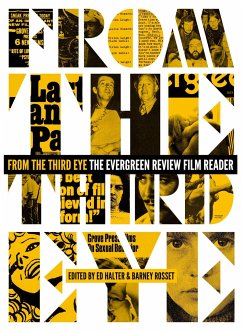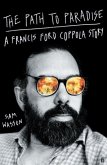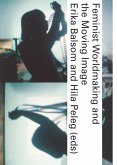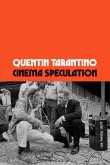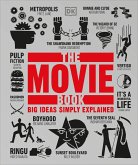25,99 €
inkl. MwSt.
Versandkostenfrei*
Liefertermin unbestimmt
Melden Sie sich
hier
hier
für den Produktalarm an, um über die Verfügbarkeit des Produkts informiert zu werden.

13 °P sammeln
- Broschiertes Buch
In this first collection of film writing from Evergreen Review, the legendary publication's important contributions to film culture are available in a single volume. Featuring such legendary writers as Nat Hentoff, Norman Mailer, Parker Tyler, and Amos Vogel, the book presents writing on the films of Jean-Luc Godard, Pier Paolo Pasolini, Ousmane Sembene, Andy Warhol, and others and offers incisive essays and interviews from the late 1950s to early 1970s. Articles explore politics, revolution, and the cinema; underground and experimental film, pornography, and censorship; and the rise of…mehr
Andere Kunden interessierten sich auch für
![The Path to Paradise The Path to Paradise]() Sam WassonThe Path to Paradise22,99 €
Sam WassonThe Path to Paradise22,99 €![Feminist Worldmaking and the Moving Image Feminist Worldmaking and the Moving Image]() Erika BalsomFeminist Worldmaking and the Moving Image27,99 €
Erika BalsomFeminist Worldmaking and the Moving Image27,99 €![Hollywood: The Oral History Hollywood: The Oral History]() Jeanine BasingerHollywood: The Oral History21,99 €
Jeanine BasingerHollywood: The Oral History21,99 €![Cinema Speculation Cinema Speculation]() Quentin TarantinoCinema Speculation20,99 €
Quentin TarantinoCinema Speculation20,99 €![Elizabeth Taylor Elizabeth Taylor]() Kate Andersen BrowerElizabeth Taylor14,99 €
Kate Andersen BrowerElizabeth Taylor14,99 €![Elizabeth Taylor Elizabeth Taylor]() Kate Andersen BrowerElizabeth Taylor19,99 €
Kate Andersen BrowerElizabeth Taylor19,99 €![The Movie Book The Movie Book]() DKThe Movie Book18,99 €
DKThe Movie Book18,99 €-
-
-
In this first collection of film writing from Evergreen Review, the legendary publication's important contributions to film culture are available in a single volume. Featuring such legendary writers as Nat Hentoff, Norman Mailer, Parker Tyler, and Amos Vogel, the book presents writing on the films of Jean-Luc Godard, Pier Paolo Pasolini, Ousmane Sembene, Andy Warhol, and others and offers incisive essays and interviews from the late 1950s to early 1970s. Articles explore politics, revolution, and the cinema; underground and experimental film, pornography, and censorship; and the rise of independent film against the dominance of Hollywood. A new introductory essay by Ed Halter reveals the important role Evergreen Review and its publisher, Grove Press, played in advancing cinema during this period through innovations in production, distribution, and exhibition. Editor Ed Halter began working on this book in 2001 with Barney Rosset, using his personal files and interviews with him as initial research.
Produktdetails
- Produktdetails
- Verlag: Seven Stories Press, U.S.
- Seitenzahl: 336
- Erscheinungstermin: 6. März 2018
- Englisch
- Abmessung: 233mm x 169mm x 25mm
- Gewicht: 448g
- ISBN-13: 9781609806156
- ISBN-10: 1609806158
- Artikelnr.: 41672017
- Verlag: Seven Stories Press, U.S.
- Seitenzahl: 336
- Erscheinungstermin: 6. März 2018
- Englisch
- Abmessung: 233mm x 169mm x 25mm
- Gewicht: 448g
- ISBN-13: 9781609806156
- ISBN-10: 1609806158
- Artikelnr.: 41672017
ED HALTER is a critic and curator living in New York City. He is a founder and director of Light Industry, a venue for film and electronic art in Brooklyn, New York, and his writing has appeared in Artforum, the Believer , Bookforum, Cinema Scope, frieze, Little Joe, Mousse, Rhizome, Triple Canopy, the Village Voice, and elsewhere. His book From Sun Tzu to Xbox: War and Video Games was published in 2006, and he is a 2009 recipient of the Creative Capital Warhol Foundation Arts Writers Grant. From 1995 to 2005, Halter programmed and oversaw the New York Underground Film Festival. He has curated screenings and exhibitions at Artists Space, BAM, the Flaherty Film Seminar, the ICA in London, the Museum of Modern Art, the New Museum, and Tate Modern, as well as the cinema component of Greater New York 2010 at MoMA PS1, and the film and video program for the 2012 Whitney Biennial. He teaches in the Film and Electronic Arts department at Bard College and is currently writing a critical history of contemporary experimental cinema in America. BARNEY ROSSET (1922–2012) was the legendary publisher who brought to America the works of dramatists Samuel Beckett and Harold Pinter, the anti-imperialist political writings of Che Guevara and Ho Chi Minh, and who published the scandalous novels of Henry Miller and William Burroughs in spite of outrage and accusations of indecency. Beat poets, French surrealists, German expressionists, and dramatists of the absurd—they all found a home at Grove Press, which he owned and ran from 1951–1985, and in the pages of the avant-garde magazine Evergreen Magazine, which he founded in 1957. A champion in the fight against all forms of puritanism, Rosset was taken to court several times on obscenity charges, most notably for publishing three novels now considered classics, Lady Chatterley’s Lover, The Tropic of Cancer, and Naked Lunch. In 1964, during a trial that would forever change the meaning of American culture and contribute to breaking down most censorship barriers, the Supreme Court would rule in his favor against those who demanded that The Tropic of Cancer be banned. Rosset had a lifelong interest in film as an art form. After serving in WWII, he shot the anti-racist documentary Strange Victory. In 1965 he commissioned Samuel Beckett to write the short movie Film, which Rosset then directed and produced starring Buster Keaton. In 1967, he bought a cinema in the Village, where he showed the Swedish film I Am Curious (Yellow), whose explicit scenes of sex and nudity brought him once again to court. Rosset was named an officer of arts and letters by the French cultural ministry and honored by the National Coalition Against Censorship for defending free expression. In 2008, he also received the lifetime achievement Literarian Award from the National Book Foundation in honor of his contributions to American publishing. A posthumous autobiography titled Barney Rosset: My Life in Publishing and How I Fought Censorship was published in 2017.
Introduction
Ed Halter
1958
The Angry Young Film Makers
Amos Vogel
1960
Jazz on a Summer's Day
Jerry Tallmer
The Magic Box
Jerry Tallmer
1967
Dragtime and Drugtime, or, Film à la Warhol
Parker Tyler
Someday What You Really are is Going to Catch Up with You
Michael O'Donoghue
13 Confusions
Amos Vogel
The New American Cinema: Five Replies to Amos Vogel
Dan Talbot, Parker Tyler, Annette Michelson, Richard Schnickel, Gregory
Markopoulos, with additional reply from Jonas Mekas
Chappaqua
Lawrence Shainberg
1968
Turning the Camera into the Audience
Nat Hentoff
Norman Mailer's Wild 90
Lita Eliscu
Warhol's Nude Restaurant
Stefan S. Brecht
Vietnam Déjà Vu: A Film Review of Godard's La Chinoise
Lita Eliscu
The Edge
Lita Eliscu
Sex and Politics: An Interview with Vilgot Sjöman
John Lahr
The Sixth New York Film Festival
Sidney Bernard
1969
A Way of Life: An Interview with John Cassavetes
Andre S. Labarthe
Lola in LA: An Interview with Jacques Demy
Michel Delahaye
The Day Rap Brown Became a Press Agent for Paramount
Amos Vogel
Solanas: Film as a Political Essay
Louis Marcorelles
Easy Rider: A Very American Thing
L.M. Kit Carson
Participatory Television
Nat Hentoff
Rocha's Film as Carnival
Frieda Grafe
Rimbaud's Desert as Seen by Pasolini
Wallace Fowlie
1970
Mister Freedom: An Interview with William Klein
Abraham Segal
Destroy, She Said: An Interview with Marguerite Duras
Jacques Rivette & Jean Narboni
The Man Who Lies: An Interview with Alain Robbe-Grillet
Tom and Helen Bishop
Do They or Don't They? Why It Matters So Much
Parker Tyler
Mandabi: Confronting Africa
Julius Lester
Seeing America First with Andy Warhol
Dotson Rader
"It Could Only Happen in California"
Dotson Rader
Women's Lib: Save the Last Dance for Me
Tom Seligson
Have You Seen It All, Dennis Hopper?
L.M. Kit Carson
Woodstock: An Interview with Michael Wadleigh and Bob Maurice
Kent E. Carroll
Mucking with the Real
L.M. Kit Carson
Film and Revolution: An Interview with Jean-Luc Godard
Kent E. Carroll
We: A Manifesto, Dziga Vertov Papatakis: Tiger in a Think-Tank
Parker Tyler
Hollywood's Last Stand
Tom Seligson
1971
Fonda, My Buddy
Seymour Krim
Eros and the Muses
Jerome Tarshis
The First Annual Congress of the High Church of Hard Core
Robert Coover
News from Phyllis and Eberhard Kronhausen
Sara Davidson
Those Homophile Husbands
Parker Tyler
Pasolini's Decameron
Tom Hamilton
Film: Freaks and Fellini
Nat Hentoff
Perverse Chic
Tom Seligson
1973
A Transit to Narcissus
Norman Mailer
Ed Halter
1958
The Angry Young Film Makers
Amos Vogel
1960
Jazz on a Summer's Day
Jerry Tallmer
The Magic Box
Jerry Tallmer
1967
Dragtime and Drugtime, or, Film à la Warhol
Parker Tyler
Someday What You Really are is Going to Catch Up with You
Michael O'Donoghue
13 Confusions
Amos Vogel
The New American Cinema: Five Replies to Amos Vogel
Dan Talbot, Parker Tyler, Annette Michelson, Richard Schnickel, Gregory
Markopoulos, with additional reply from Jonas Mekas
Chappaqua
Lawrence Shainberg
1968
Turning the Camera into the Audience
Nat Hentoff
Norman Mailer's Wild 90
Lita Eliscu
Warhol's Nude Restaurant
Stefan S. Brecht
Vietnam Déjà Vu: A Film Review of Godard's La Chinoise
Lita Eliscu
The Edge
Lita Eliscu
Sex and Politics: An Interview with Vilgot Sjöman
John Lahr
The Sixth New York Film Festival
Sidney Bernard
1969
A Way of Life: An Interview with John Cassavetes
Andre S. Labarthe
Lola in LA: An Interview with Jacques Demy
Michel Delahaye
The Day Rap Brown Became a Press Agent for Paramount
Amos Vogel
Solanas: Film as a Political Essay
Louis Marcorelles
Easy Rider: A Very American Thing
L.M. Kit Carson
Participatory Television
Nat Hentoff
Rocha's Film as Carnival
Frieda Grafe
Rimbaud's Desert as Seen by Pasolini
Wallace Fowlie
1970
Mister Freedom: An Interview with William Klein
Abraham Segal
Destroy, She Said: An Interview with Marguerite Duras
Jacques Rivette & Jean Narboni
The Man Who Lies: An Interview with Alain Robbe-Grillet
Tom and Helen Bishop
Do They or Don't They? Why It Matters So Much
Parker Tyler
Mandabi: Confronting Africa
Julius Lester
Seeing America First with Andy Warhol
Dotson Rader
"It Could Only Happen in California"
Dotson Rader
Women's Lib: Save the Last Dance for Me
Tom Seligson
Have You Seen It All, Dennis Hopper?
L.M. Kit Carson
Woodstock: An Interview with Michael Wadleigh and Bob Maurice
Kent E. Carroll
Mucking with the Real
L.M. Kit Carson
Film and Revolution: An Interview with Jean-Luc Godard
Kent E. Carroll
We: A Manifesto, Dziga Vertov Papatakis: Tiger in a Think-Tank
Parker Tyler
Hollywood's Last Stand
Tom Seligson
1971
Fonda, My Buddy
Seymour Krim
Eros and the Muses
Jerome Tarshis
The First Annual Congress of the High Church of Hard Core
Robert Coover
News from Phyllis and Eberhard Kronhausen
Sara Davidson
Those Homophile Husbands
Parker Tyler
Pasolini's Decameron
Tom Hamilton
Film: Freaks and Fellini
Nat Hentoff
Perverse Chic
Tom Seligson
1973
A Transit to Narcissus
Norman Mailer
Introduction
Ed Halter
1958
The Angry Young Film Makers
Amos Vogel
1960
Jazz on a Summer's Day
Jerry Tallmer
The Magic Box
Jerry Tallmer
1967
Dragtime and Drugtime, or, Film à la Warhol
Parker Tyler
Someday What You Really are is Going to Catch Up with You
Michael O'Donoghue
13 Confusions
Amos Vogel
The New American Cinema: Five Replies to Amos Vogel
Dan Talbot, Parker Tyler, Annette Michelson, Richard Schnickel, Gregory
Markopoulos, with additional reply from Jonas Mekas
Chappaqua
Lawrence Shainberg
1968
Turning the Camera into the Audience
Nat Hentoff
Norman Mailer's Wild 90
Lita Eliscu
Warhol's Nude Restaurant
Stefan S. Brecht
Vietnam Déjà Vu: A Film Review of Godard's La Chinoise
Lita Eliscu
The Edge
Lita Eliscu
Sex and Politics: An Interview with Vilgot Sjöman
John Lahr
The Sixth New York Film Festival
Sidney Bernard
1969
A Way of Life: An Interview with John Cassavetes
Andre S. Labarthe
Lola in LA: An Interview with Jacques Demy
Michel Delahaye
The Day Rap Brown Became a Press Agent for Paramount
Amos Vogel
Solanas: Film as a Political Essay
Louis Marcorelles
Easy Rider: A Very American Thing
L.M. Kit Carson
Participatory Television
Nat Hentoff
Rocha's Film as Carnival
Frieda Grafe
Rimbaud's Desert as Seen by Pasolini
Wallace Fowlie
1970
Mister Freedom: An Interview with William Klein
Abraham Segal
Destroy, She Said: An Interview with Marguerite Duras
Jacques Rivette & Jean Narboni
The Man Who Lies: An Interview with Alain Robbe-Grillet
Tom and Helen Bishop
Do They or Don't They? Why It Matters So Much
Parker Tyler
Mandabi: Confronting Africa
Julius Lester
Seeing America First with Andy Warhol
Dotson Rader
"It Could Only Happen in California"
Dotson Rader
Women's Lib: Save the Last Dance for Me
Tom Seligson
Have You Seen It All, Dennis Hopper?
L.M. Kit Carson
Woodstock: An Interview with Michael Wadleigh and Bob Maurice
Kent E. Carroll
Mucking with the Real
L.M. Kit Carson
Film and Revolution: An Interview with Jean-Luc Godard
Kent E. Carroll
We: A Manifesto, Dziga Vertov Papatakis: Tiger in a Think-Tank
Parker Tyler
Hollywood's Last Stand
Tom Seligson
1971
Fonda, My Buddy
Seymour Krim
Eros and the Muses
Jerome Tarshis
The First Annual Congress of the High Church of Hard Core
Robert Coover
News from Phyllis and Eberhard Kronhausen
Sara Davidson
Those Homophile Husbands
Parker Tyler
Pasolini's Decameron
Tom Hamilton
Film: Freaks and Fellini
Nat Hentoff
Perverse Chic
Tom Seligson
1973
A Transit to Narcissus
Norman Mailer
Ed Halter
1958
The Angry Young Film Makers
Amos Vogel
1960
Jazz on a Summer's Day
Jerry Tallmer
The Magic Box
Jerry Tallmer
1967
Dragtime and Drugtime, or, Film à la Warhol
Parker Tyler
Someday What You Really are is Going to Catch Up with You
Michael O'Donoghue
13 Confusions
Amos Vogel
The New American Cinema: Five Replies to Amos Vogel
Dan Talbot, Parker Tyler, Annette Michelson, Richard Schnickel, Gregory
Markopoulos, with additional reply from Jonas Mekas
Chappaqua
Lawrence Shainberg
1968
Turning the Camera into the Audience
Nat Hentoff
Norman Mailer's Wild 90
Lita Eliscu
Warhol's Nude Restaurant
Stefan S. Brecht
Vietnam Déjà Vu: A Film Review of Godard's La Chinoise
Lita Eliscu
The Edge
Lita Eliscu
Sex and Politics: An Interview with Vilgot Sjöman
John Lahr
The Sixth New York Film Festival
Sidney Bernard
1969
A Way of Life: An Interview with John Cassavetes
Andre S. Labarthe
Lola in LA: An Interview with Jacques Demy
Michel Delahaye
The Day Rap Brown Became a Press Agent for Paramount
Amos Vogel
Solanas: Film as a Political Essay
Louis Marcorelles
Easy Rider: A Very American Thing
L.M. Kit Carson
Participatory Television
Nat Hentoff
Rocha's Film as Carnival
Frieda Grafe
Rimbaud's Desert as Seen by Pasolini
Wallace Fowlie
1970
Mister Freedom: An Interview with William Klein
Abraham Segal
Destroy, She Said: An Interview with Marguerite Duras
Jacques Rivette & Jean Narboni
The Man Who Lies: An Interview with Alain Robbe-Grillet
Tom and Helen Bishop
Do They or Don't They? Why It Matters So Much
Parker Tyler
Mandabi: Confronting Africa
Julius Lester
Seeing America First with Andy Warhol
Dotson Rader
"It Could Only Happen in California"
Dotson Rader
Women's Lib: Save the Last Dance for Me
Tom Seligson
Have You Seen It All, Dennis Hopper?
L.M. Kit Carson
Woodstock: An Interview with Michael Wadleigh and Bob Maurice
Kent E. Carroll
Mucking with the Real
L.M. Kit Carson
Film and Revolution: An Interview with Jean-Luc Godard
Kent E. Carroll
We: A Manifesto, Dziga Vertov Papatakis: Tiger in a Think-Tank
Parker Tyler
Hollywood's Last Stand
Tom Seligson
1971
Fonda, My Buddy
Seymour Krim
Eros and the Muses
Jerome Tarshis
The First Annual Congress of the High Church of Hard Core
Robert Coover
News from Phyllis and Eberhard Kronhausen
Sara Davidson
Those Homophile Husbands
Parker Tyler
Pasolini's Decameron
Tom Hamilton
Film: Freaks and Fellini
Nat Hentoff
Perverse Chic
Tom Seligson
1973
A Transit to Narcissus
Norman Mailer
